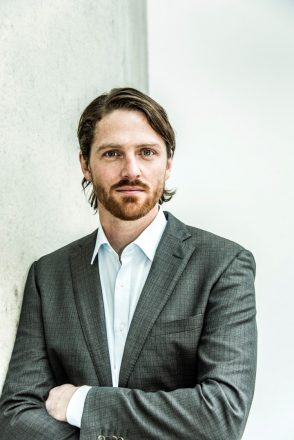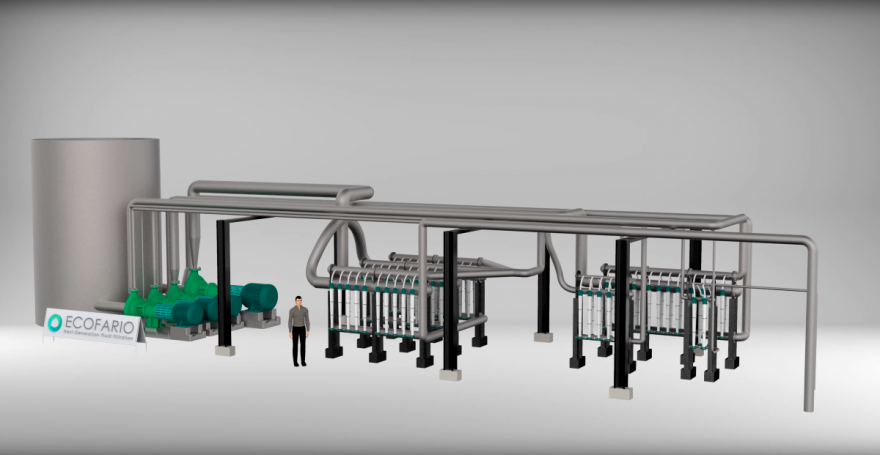The Munich startup Ecofario has developed a technology that can efficiently filter microplastics out of wastewater. The patented method uses what is known as the hydrocyclone principle in a more efficient and cost-effective manner than has been possible so far. The aim now is to finance the prototype with a crowdfunding campaign. The founders’ vision: To equip all of the world’s wastewater systems with their technology! Ecofario CEO and founder Sebastian Porkert talked about how they might get there.
1. Who are you and what do you do? Please briefly introduce yourselves and your product!

We’re the greentech startup Ecofario and want to filter microplastics out of water with our innovative technology. That will allow us to minimize the amount of pollutants that enter our streams, rivers, lakes and oceans through our wastewater and sewage treatment plants.
How a vortex separates microplastics from wastewater
Our patented technology is based on the hydrocyclone principle. That means we generate an extreme but very defined vortex in the wastewater, which makes the force of gravity on the water nearly 2000 times greater. This then causes the microplastic particles to separate from the water.
Our systems are meant to be the last step in sewage treatment plants. Then microplastics will stop being released into the environment! Because our technology is extremely robust and efficient, it is significantly more cost effective compared to our competitors.
The Ecofario team currently consists of four founders: As a graduate engineer in paper technology, I offer the team my expertise in industrial process engineering and invented the technology. Our second Managing Director and CFO Adrian Scholl is a graduate translator. Adrian has been working in high-level project management for several years and is currently in the final phase of his MBA. Robert Krapez is in charge of research and development. He is an engineer in paper technology and mechanical engineering and is currently in the second half of his Master’s program in the field of mechanical engineering. The fourth in our group is Stefan Tomme, who is head of application technology. He is a trained IT system electronics specialist and energy systems engineer.
2. But that’s already been done!
Yes and no! The basic principle of our technology, the hydrocyclone principle, is an established procedure and has been used to separate multi-phase mixtures for quite some time.
Nevertheless, we’ve managed to modify the principle so that our variant increases efficiency by up to a factor of 50 compared to conventional methods. These modifications are so new that we were able to successfully apply for a patent. That means we’re able to filter small particles such as microplastics, which differ only very slightly from water in terms of density, out of the water without a filter bed or a fabric filter. As a result, our technology opens up completely new realms for its possible use, one of which happens to be the filtration of microplastics.

Long dry spells on the path from research to founding
3. What was your biggest challenge so far?
Our biggest challenge so far was to soundly found Ecofario GmbH. Because we’ve been working on and researching the subject for five years now, we went through a long dry spell. For the patent, trademark registration, etc., we had to dig deep in our own pockets. Fortunately, that dry spell seems to be slowly coming to an end.
It was really important to us to think through everything we do down to the very last detail. We don’t want to make any hasty decisions. While this strategy has made us relatively slow, we’ve yet to make any decisions that we’ve regretted or that have caused problems. That means we’ve laid the perfect foundation for Ecofario. And that basis makes it possible for us to operate under the best possible conditions.
“Now we can keep the nitty-gritty out of the environment!”
4. Now let’s get down to the nitty-gritty: How is business going?
Now we can keep the nitty-gritty out of the environment! Because we’re still in the development stage and haven’t put a product on the market that can be sold yet, we can’t show off any big figures. Our next step is to build a mobile prototype at a scale of 1:1. We expect to be able to test and demonstrate the prototype for future customers by the end of the year. The information that we gather as a result will form the basis for scaling up to our first pilot system, which should be running by 2021 at the latest.
We’re currently trying to raise the capital to build our prototype with a crowdfunding campaign. So if anyone feels interested or motivated at this point: We’re grateful for any type of support!
Everything a startup heart could desire
5. What does Munich mean to you?
Munich and its surroundings are home to us, which makes it an integral part of our lives. Thanks to its proximity to the mountains and lakes, we as self-confessed nature freaks have everything we need for our free time. On the other hand, Munich also has an excellent network and a very good startup scene to offer. Because we originally come from SCE, we were able to enjoy these privileges from the beginning. Moreover, the IHK (Chamber of Industry and Commerce) and a number of Bavarian cluster initiatives are also very positive location factors for us. Long story short: We have everything our startup hearts could desire in Munich!
6. How will your startup become the next unicorn? Or will we be seeing you at an Epic Fail Night soon?
We might meet up at an Epic Fail Night, but we would be there as part of the audience to learn from bad decisions together. To avoid having to get up on stage, we’ve done everything possible to give our startup a sound future. If gaining a footing in wastewater treatment doesn’t work out, we still have a few other aces up our sleeves. That’s because we can also successfully and profitably employ our technology in other areas as well. At the moment, it’s all systems go. That’s why we feel very confident about being able to soundly establish our company in our market of focus.
7. What are three examples of how you can easily do without plastic in everyday life?
Unfortunately, plastic has become a very established and almost fundamental pillar of our society. As a consequence, it will probably take generations to completely replace mineral oil based plastic. A first step would be to deliberately give up unnecessary plastic products. Three examples:
- Food packaging: Opt for unpackaged products. The packaging industry will deliver plastic packaging as long as we buy it as customers. We as consumers are what can make a difference.
- Plastic bags: Paper is better because it’s completely degradable, or it’s best to go straight for multi-use solutions.
- Straws: Either stop using them completely, or use a paper version instead. Other countries, like Australia, are already setting a very good example.
That being said, we also think avoiding products is not the only key to success. What’s much more important on one hand is to be very conscious about recycling. That’s the only way a successful recycling economy can function. On the other hand, we should also be really careful about consciously keeping our environment clean. Anyone can contribute to keeping things clean: Collect and throw away a few pieces of trash every time you go for a walk. If just one in ten people in Munich did that, then we could easily eat off the streets!

